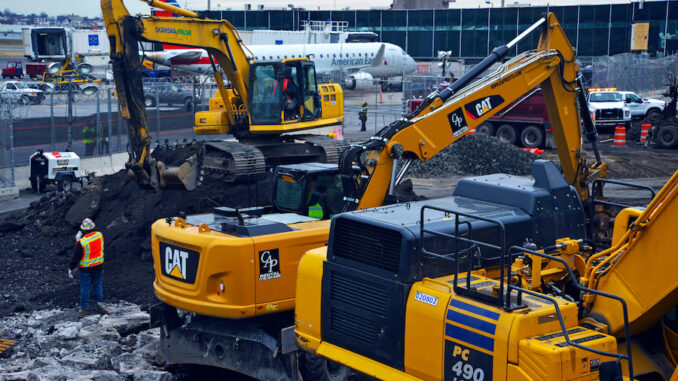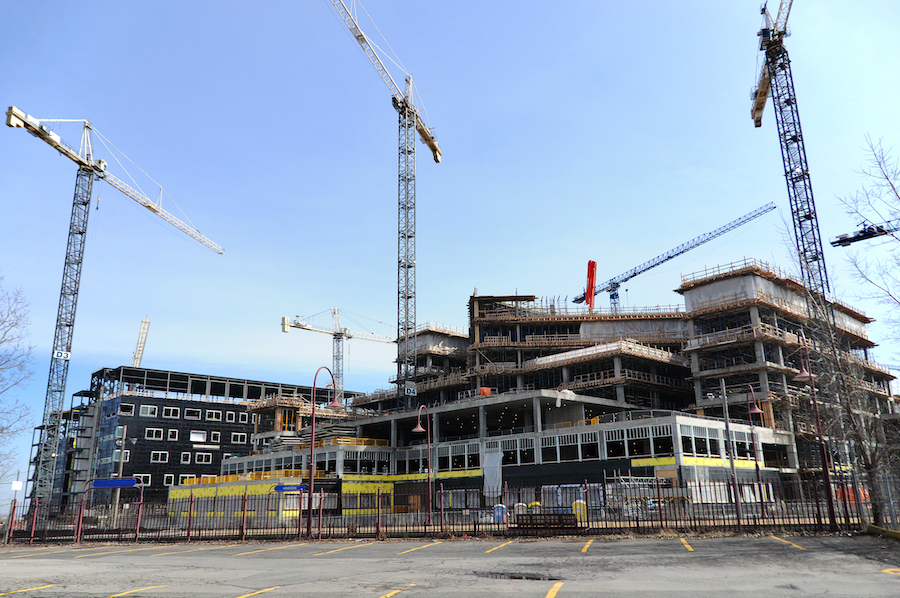
View the complete article here.
Did you know that in 2022 the federal government spent $36.6 billion directly on infrastructure projects? What does this mean? This means that there’s a lot of money out there that you, the contractor, can get your hands on.
And this doesn’t just apply to the big contractors. In the same year, over $15 billion was awarded directly to small construction-related businesses.
The demand is high and the rewards can be huge for government projects, but it’s important to understand that the bidding process is different from private, non-government projects.
Bidding on government projects can be complex and requires significant planning and preparation. Also, there are strict regulations that contractors must adhere to—and don’t forget about potential pre-qualification requirements.
So for those of you contractors reading this, who are ready to learn and work hard, we’ve put together this guide just for you. We’re going to show you how to deal with the strict regulations, how to crush the bidding process, how the selection process works, and—to finish—we’ve compiled a list of crucial tips to help you get ahead of your competition and win those big government projects.
Do Contractors Make More Money with Government Projects?
With some exceptions, of course, the short answer is “yes”—you can make excellent money—millions—with government projects. Government projects often come with a guarantee of scale and longevity, providing a steady revenue stream over extended periods. In addition, governments—especially in stable economies—tend to be reliable payers, reducing financial uncertainties. The prestige associated with executing large-scale public projects can also bolster a contractor’s reputation, positioning them favorably for future contracts.
Have you ever heard the expression that “fortune favors the bold?” Well, when it comes to winning government projects, this is certainly the case for contractors.

Types of Government Projects
Before we get into the nitty-gritty details, here is a quick list of some—not all—of the most common government projects that you should know:
- Highways, bridges, and other transportation infrastructure
- Airports and other transportation terminals
- Community centers and public libraries
- Federal and state government buildings
- Military bases and installations
- Correctional facilities
- Courthouses and police stations
- Public schools and universities
- Hospitals and healthcare facilities
- Water treatment plants and other utility projects
- Parks and recreational facilities
Strict Requirements and Guidelines
Compared to typical projects, government projects have stricter regulations and guidelines that must be followed. If you’re not planning on strictly adhering to these regulations and guidelines, you can kiss your chances of winning any of these projects goodbye.
So what are these “strict regulations and guidelines?” Here’s a list that you should be aware of:
- Punctual completion of required paperwork—such as progress reports, payrolls, and certified payrolls.
- Compliance with federal, state, and local regulations related to environmental protection—such as obtaining necessary permits and managing hazardous materials.
- Compliance with safety standards set forth by the Occupational Safety and Health Administration (OSHA) and other appropriate agencies.
- Adherence to specific construction procedures—such as quality control and quality assurance programs, testing and inspection protocols, and reporting requirements.
- Use of approved materials and products that meet relevant standards and specifications.
- Compliance with labor laws related to wages, benefits, and working conditions—such as the Davis-Bacon Act.
- Use of disadvantaged business enterprises (DBEs) and small businesses in the project team—as mandated by the government agency overseeing the project.
Of course, more regulations and guidelines may be required for a certain government project—this is just a basic list. Also, keep in mind that specific requirements will likely be impacted by the type of project, the location, as well as the funding source. For that reason, it’s imperative that you carefully review the bid documents and possibly even consult with experts—as needed—to ensure compliance with all appropriate regulations and guidelines.

Extensive Paperwork and Documentation
Don’t like doing paperwork? Well, then government projects may not be for you. Even if you hire someone to handle the paperwork for you, it’s still important that you have thoroughly reviewed and understand everything contained within it.
Some of this paperwork is likely to include:
- Pre-qualification applications: Contractors may be required to submit pre-qualification applications to demonstrate their technical expertise, financial stability, and—of course—experience in completing similar projects.
- Bid bonds: Contractors are often required to obtain a bid bond—which is a type of insurance that guarantees the contractor will enter into a contract if their bid is accepted.
- Performance bonds: Contractors must obtain performance bonds—which ensure that the contractor will complete the project according to the terms of the contract.
- Payment bonds: Payment bonds ensure that the contractor will pay all laborers, subcontractors, and suppliers associated with the project.
- Insurance certificates: Contractors must provide certificates of insurance that meet the requirements specified in the bid documents.
- Certified payroll reports: Contractors must submit payroll reports that detail the hours worked and wages paid to each worker—including any benefits or fringe benefits.
- Progress reports: Contractors must submit regular progress reports that detail the status of the project and any issues that may impact the timeline or budget.
- Change orders: Contractors must submit change orders when modifications to the scope of work are required.
- Closeout documents: Contractors must submit closeout documents that demonstrate that the project has been completed in accordance with the contract and all required regulations and guidelines.
Formal and Competitive Bidding Process
The bidding process for government projects is typically more formal, competitive, and complex than the bidding process for private projects.
Regarding the strict requirements and guidelines that we mentioned earlier—these are in place to ensure the following:
- Transparency: All bidders should have access to the same information and opportunities—in order to promote fair competition and help prevent favoritism or bias in the selection process.
- Fairness: All bidders should be evaluated based on the same criteria, and the selection process should be fair and objective. This helps prevent any one bidder from gaining an unfair advantage over others.
- Accountability: Accountability helps ensure that the government agency overseeing the project can hold contractors accountable for meeting all project requirements and delivering the project on time and within budget. This promotes responsible use of taxpayer dollars and helps ensure that the public receives high-quality construction services.
Overall, the competitive bidding process for DOT and government construction projects is designed to ensure that the government agencies procure the best services at the best value for taxpayers—while also providing a fair opportunity for contractors to compete for these types of projects.
Criteria Versus Price
When it comes to government projects, the selection process is often based more on criteria than price. This predetermined criteria is used to evaluate each bidder’s qualifications and capabilities beyond just offering a competitive price.
This “criteria” may include:
- Experience: The government agency may consider the bidder’s experience on similar projects, particularly in terms of project complexity and size, as well as the bidder’s familiarity with any specific regulations or guidelines related to the project.
- Past performance: The agency may review the bidder’s past performance on previous projects—particularly with regard to completing projects on time, within budget, and to the required quality standards.
- Technical expertise: The agency may evaluate the bidder’s technical expertise and knowledge related to the specific type of construction project being bid on, such as specialized building materials or construction techniques.
- Safety record: The agency may review the bidder’s safety record, particularly with regard to adherence to OSHA standards and compliance with environmental regulations.
- DBE and small business participation: The agency may give preference to bidders that have a plan to include disadvantaged business enterprises (DBEs) or small businesses in the project team, as mandated by the government agency overseeing the project.
While price is still an important factor in the bidding process for government projects, it is often not the only or even the most important factor. Bidders must demonstrate their qualifications and capabilities in all areas of the bidding process, from the initial proposal submission to final negotiations and execution of the contract.
Tips for Bidding on Government Projects
To conclude, here’s a list of tips which we feel are crucial to defeat your competition and win government projects:
- Attend pre-bid meetings: Attend pre-bid meetings and site visits to ask questions and gain a better understanding of the project requirements and expectations.
- Review bid documents carefully: Read the bid documents carefully and make sure you understand all requirements, regulations, and guidelines.
- Obtain necessary certifications: Obtain any necessary certifications or licenses required for the project, such as environmental permits or safety certifications.
- Identify potential subcontractors: Identify potential subcontractors and suppliers who can help you meet the project requirements and specifications.
- Review and understand the selection criteria: Review and understand the selection criteria that will be used to evaluate bids and make sure you address all required criteria in your proposal.
- Submit a comprehensive proposal: Submit a comprehensive proposal that addresses all required criteria and clearly demonstrates your qualifications and capabilities for the project.
- Include detailed pricing information: Include detailed pricing information in your proposal, including a breakdown of costs and any contingencies or assumptions.
- Submit required paperwork and documentation: Submit all required paperwork and documentation on-time and in the correct format—including bid bonds, performance bonds, insurance certificates, and certified payroll reports.
- Follow up on your bid: Follow-up on your bid after submission to ensure that all paperwork and documentation has been received and to address any questions or concerns that may arise.
- Be prepared for negotiations: Be prepared for negotiations if your bid is selected, and be willing to work with the government agency to address any issues or concerns that may arise during the course of the project.
- Maintain high standards throughout the project: Maintain high standards throughout the project—including adherence to regulations and guidelines, safety protocols, and quality control procedures.
For those of you who want to master the bidding process and build a construction business that generates millions per year, then you should check out the Heavy Ape courses.
View the complete article here.
Can contractors make more money with government projects?
Yes, contractors can potentially earn millions with government projects due to the guaranteed scale, steady revenue, and the reliability of payments, along with the prestige associated with executing large-scale public projects.
What are the key requirements and guidelines for contractors bidding on government projects?
Key requirements include punctual completion of paperwork, compliance with environmental regulations, adherence to safety standards (OSHA), use of approved materials, compliance with labor laws (Davis-Bacon Act), and the involvement of disadvantaged business enterprises (DBEs) and small businesses in the project team.












































